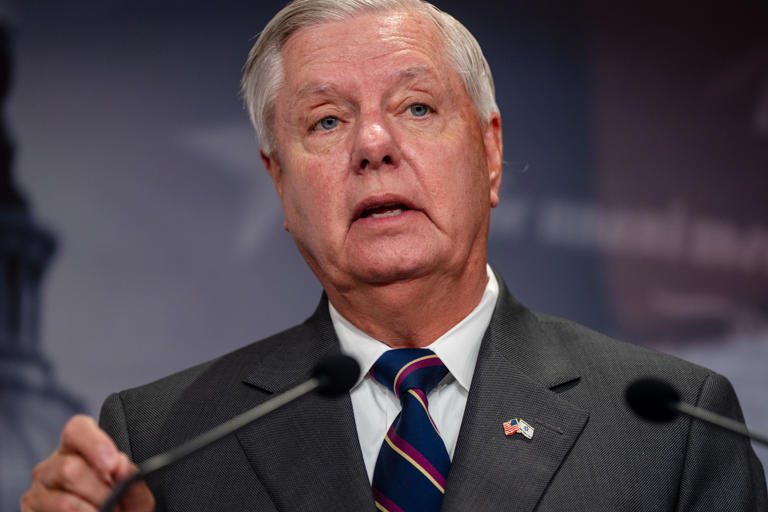Lindsey Graham Cautions Republicans on Proposed Tax Cut Strategies
During an appearance Sunday Morning Futures with Maria Bartiromo, Senator Lindsey Graham, a South Carolina Republican and Senate Budget Committee chair, issued a stern warning to fellow Republicans advocating for tax cuts. Graham emphasized that securing the nation’s borders must take precedence, cautioning that failing to do so would jeopardize national security.
Republicans are grappling with how to advance their legislative priorities under President-elect Donald Trump, who campaigned heavily in the 2024 election on two major promises: extending individual tax cuts and addressing immigration by deporting undocumented immigrants. These internal debates, combined with slim GOP majorities in the House and Senate, could create delays in executing the president-elect’s agenda.
Legislative Strategy Debate
House Speaker Mike Johnson of Louisiana recently informed GOP lawmakers at a retreat that Trump supports consolidating their legislative agenda into a single comprehensive bill, according to Politico. This approach contrasts with the original two-phase plan proposed by Senate Majority Leader John Thune of South Dakota.
Thune’s strategy envisioned an initial reconciliation bill focusing on border security, defense, and energy policies within Trump’s first 30 days in office, followed by a separate bill later addressing the extension of 2017 tax cuts, which are set to expire in 2025. Meanwhile, House Ways and Means Committee Chair Jason Smith of Missouri has emerged as a key proponent of the single-package approach, meeting with Trump at Mar-a-Lago to strategize.
Graham’s Stance
Speaking to Bartiromo, Graham expressed concerns about the “catch-all” bill strategy. “If we don’t prioritize border security, it’s going to be a nightmare for our national security,” he warned. He pointed to the costs associated with Trump’s plan to deport millions of undocumented immigrants, estimating it would require $100 billion.
“I’m willing to find offsets for that cost, but Democrats won’t agree to fund mass deportations,” Graham said, citing challenges in bipartisan cooperation. He also highlighted the urgency of addressing the fentanyl crisis and potential terrorism threats, stressing that “every day we delay is a dangerous day for America.”
While Graham acknowledged the importance of extending the $4.7 trillion in tax cuts, he insisted that border security must come first. “To the tax cut wing of the party, I am with you,” he stated, “but if you hold border security hostage to get tax cuts, you’re playing Russian roulette with our national security.”
Why It Matters
The debate reflects broader tensions within the Republican Party as it navigates Trump’s legislative priorities. With time-sensitive issues like border security and tax cuts at stake, the GOP must reconcile internal divisions to avoid stalling its agenda in the new administration.
Debate Over Legislative Strategy: Republicans Weigh Options for Advancing Trump’s Agenda
What People Are Saying
In an appearance on Sunday Morning Futures, House Speaker Mike Johnson addressed the ongoing debate over legislative strategy for advancing President-elect Donald Trump’s priorities. When asked whether Trump favors passing two separate bills or one comprehensive package, Johnson said:
“He and I have talked about this quite a bit over the past few months, weighing the pros and cons of both approaches. While I respect Lindsey Graham and others who prefer a two-step strategy, I believe President Trump ultimately favors what he calls ‘one big, beautiful bill.'”
Johnson elaborated on the benefits of a single-package approach: “There’s a lot of merit to it. A unified bill allows for one major up-or-down vote, streamlining the process and giving us more time to negotiate the details and get it right. It’s an opportunity to address multiple critical issues at once and potentially save the country.”
Representative Jason Smith, chair of the House Ways and Means Committee, echoed this sentiment during an earlier appearance on Fox Business’ Mornings with Maria. “We need a reconciliation bill that includes border security, energy policy, permitting reform, and tax cuts. Combining these priorities into one package allows us to deliver a comprehensive win for President Trump and the American people,” Smith said. “The House has been preparing for months to ensure this omnibus approach can be executed as early as possible.”
What Happens Next
The Republican Party now faces the challenge of aligning its legislative strategy with Trump’s preference for a consolidated package. Speaker Johnson must navigate the delicate balance of uniting House and Senate GOP members while maintaining momentum for Trump’s ambitious agenda.
Immediate priorities for the GOP include finalizing plans for the single-package bill and ensuring it aligns with the narrow Republican majorities in Congress. Additionally, Johnson will oversee the certification of Trump’s electoral victory ahead of the January 20 inauguration, setting the stage for the new administration to hit the ground running.
With immigration reform, energy policy, and tax cuts at the forefront, Republicans will need to work quickly to address competing priorities while maintaining party unity in the face of tight legislative deadlines.
